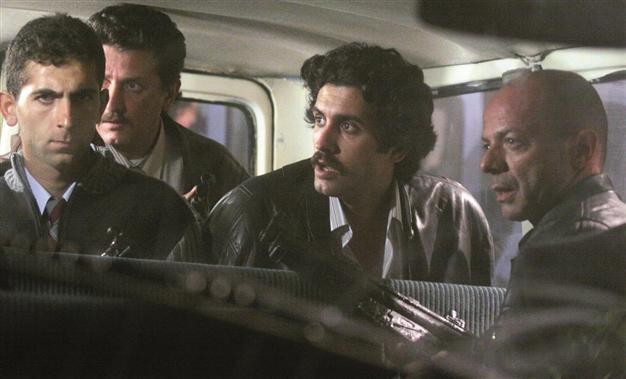Serving time in Turkish cinema
Emrah GÜLER

One of this week’s new releases (and one of the final releases of the season) is the prison comedy “Koğuş Akademisi” (The Ward Academy).
The month of May marks the end of the movie season for Turkish cinema. It is also the month for spring cleaning for distributors of Turkish movies. Movies awaiting their release find theaters before they take their places in collective memories or obscurity.
One of this week’s new releases (and one of the final releases of the season) is the prison comedy “Koğuş Akademisi” (The Ward Academy). Director and co-producer Tolga Baş’s debut feature sees a group of fun-loving prison inmates trying to hone their nonexistent crafts in acting as they try to stage a play in prison. The new sexy wardress serves to fuel the testosterone that is at the heart of the comedy.
The comedy gives more than a few laughs, thanks mostly to rising TV and comedy actor Çetin Altay’s subdued acting when compared to the others in the roles of the inmates. Veteran actor Erkan Can and football star Pascal Nouma raise the bar in this otherwise forgettable comedy.
The film, at least, is a pioneer in Turkish cinema in making light of life in prison. Not having the greatest track record in human rights, prisons have inspired Turkish filmmakers for decades now. Not in a light-hearted way like “Koğuş Akademisi,” of course. Destroyed lives, the consequences of breaking the law in the name of a cause, the colossal letdown of justice or of the government, and a deep-rooted sadness are some of the themes explored in prison dramas Turkish audience have been watching for a long time.
1980 coup brings with it prison moviesThe classic prison dramas in Turkish cinema mostly go back to a dark period, to the aftermath of the Sept. 12, 1980, military coup, when censorship, bans, arrests and disappearances while in custody marked the period. Turkish cinema was deemed as an enemy of the state, with many filmmakers taken into custody or sent to prison. Directors like Şerif Gören and Zeki Demirkubuz, as well as actors like Tarık Akan, were among those who had their share of prison time.
Not long afterwards, filmmakers began taking the coup and its aftermath as central parts of their stories. One of the first films to deal with the coup was late director Zeki Ökten’s “Ses” (The Voice) of 1986. Here, Akan played an ex-convict who, after starting a new life in a coastal town after his release, recognized the voice of his torturer who had sent him to hell and back in prison. The psychological drama continues to be one of the best in how post-traumatic complications can mess with a person’s life.
The same year, another film from yet another acclaimed director, and starring another big name, was released. Gören’s “Sen Türkülerini Söyle” (Sing Your Songs) starred Kadir İnanır as another ex-convict of the coup. Instead of focusing on the past, and dealing with themes of redemption and revenge, the film focused on its protagonist Hayri’s heart-breaking confrontation with a changed world that included his family and close friends.
The disappearances, arrests and torture right after the 1980 coup became the subject of another movie decades later. 2006’s “Eve Dönüş” (Coming Home), directed by Ömer Uğur and starring heartthrob Memet Ali Alabora, told the story of an unsuspecting worker whose vengeful landlord informs on him as a militant. Prison and torture awaited the innocent worker in this story of witch-hunting.
One memorable prison drama, released in 2008, took an unprecedented approach in its production, taking real-life prisoners as its actors, writers and even composers. The idea for popular comedian Hamdi Alkan’s directorial debut “Bayrampaşa: Ben Fazla Kalmayacağım” (Bayrampaşa: I Won’t Be Staying Long) came after the Script Writers Association (SENDER) began a series of workshops held in prisons in 2006 in Istanbul to involve prisoners in writing. There should be one final mention on prison movies in Turkey, last year’s “F Tipi Film” (F-Type). Consisting of 10 short films by leading Turkish directors like Barış Pirhasan, Sırrı Süreyya Önder and Reis Çelik, the films take a look at the harsh conditions of Turkey’s F-type prisons, reserved for convicted terrorists and political prisoners. Suffice it to say, “F Tipi Film” is on one end of the spectrum, while this week’s “Koğuş Akademisi” is on the other.
